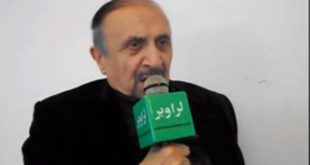Moscow in support of a continuation of War to discourage Western competition from their quest to dominate Afghanistan’s bountiful natural resources
Moscow: In March of this year, a Russia-led Collective Security Treaty Organization (CTSO) voiced disapproval with not being included in what was termed “Afghan Dialogue.” A reference to unilateral decisions being taken by the United States decisions that affect not only the so-called “war on terror”, but deliberations relating to commercial opportunities that have excluded Russia from the Trans Afghan Pipeline (TAP) contracting process. Russia, however, is on the offensive, countering with an arms/training package offer for the fledging Afghan Army, said to represent hundreds of millions of dollars. The reality however is that Russia is currently alleged to be and to have been supplying arms to both the government and the Resistance.
This story follows immediate observations and subsequent statements by Afghan translators serving with the U.S. Military that “Russia has recommenced arms shipments to elements known collectively as the Northern Alliance.” Such a juxtaposition or kaleidoscope of weapons transfer borders on the incredulous as the following interview will attest. According to an al-Jazeera interview with a captured Taliban prisoner in Kandahar on March 17, “Russia has become a major source of arms for the Taliban along with Saudi Arabia and Pakistan.” Though unsubstantiated, the interview takes on additional currency with the knowledge that Victor Bout, former KGB officer and notorious international arms smuggler, also known as the Lone Wolf, has supplied various Afghan factions with arms over the past two or more decades including those of Ahmad Shah Massoud and the Taliban. And, according to U.N. investigators…could not have done so without the knowledge, participation and connivance of the Russian Government. (See: The Great Game by Peter Hopkirk, 1990, 1992, 2002)
But perhaps most troubling is the language construct of the arms contract. As an apportionment, unspecified references to war reparations owed Afghanistan by Russia, and Russia’s claim of Afghanistan’s indebtedness to Moscow are incorporated in the text. The unsettling nature of this document is multi-faceted. First, the disbursements or credits relative to war reparations due Afghanistan and the disposition of the so-called Afghan indebtedness are not enumerated and or specified. Other spurious elements include, but not limited to, equipment such as T-55 tanks as stipulated in the contract are beyond their useful service life and thus of dubious military value.
In response to critics, the Russians have argued that the aging equipment is beneficial as the “Afghans are accustomed to using this equipment and therefore will not require extensive training or familiarization.” Could it be that the wily Russians are scheming to trade their rusting Cold War relics to Afghanistan in lieu of paying the billions owed in war reparations? Or one might ask as to the nature of the deliberations and the justifications for the Karzai Government to accept and initially approve such a one-sided measure that is obviously of more benefit to Moscow than to Afghanistan. The answer may lie in a statement by Russian Foreign Minister Sergei Ivanov when he said, “We should be represented in any Afghan discussion or dialogue, as you know…we have many friends in the Northern Alliance.” (See: Time to Ditch the Northern Alliance, by S. Frederick Starr, Wall Street Journal, Editorial Page, 2/26/02)
The special relationship that once existed and yet exists between the late Ahmad Shah Massoud and his protégés: Rabbani, Dostum, Fahim, Qanoni,Atta, Abdullah Abdullah, Ismael Khan, and others with the Soviet Government had been thoroughly investigated by a legion of accredited, independent journalists and well-documented. But germane to the discussion by virtue of holding a ministerial portfolio in the Karzai Government, is the discovery that Ismael Khan, as had Massoud, signed non-aggression pacts with the Soviet Fortieth Army. In an interview held on 10 August 1988, Russian Major General Lev Serebrov told British journalist Marl Urban, “Soviet generals openly admitted that they had agreed with Ismael Khan, the successful local ISAF commander, that there would be a truce to allow the safe withdrawal of Soviet formations.” (See: War in Afghanistan by Mark Urban, 1990, p.253) Ismael Khan is, of course, but one of many of “Russia’s friends in the Northern Alliance” that currently hold important posts in the Karzai Government, and as such, in a position to support Russian commercial interests. It is difficult if not impossible to imagine a scenario whereby Afghan interests would be subordinated to Russian interests and penetration of Afghan governmental institutions under the rubric of military aid, as took place during the 1970s. But given the fabric of the existing Russian-friendly government, it appears that once again history is about to repeat itself. (See: Communications by Members of the Afghan Diaspora about Events in Afghanistan to US Leaders, the UN and World Leaders September 21, 1979-October 7, 2013, by Dr. M.Siddieq Noorzoy,pp.1-17,1-6,1-3, 2013, Afghanistan, Political Frailty and Foreign Interference by Dr. Nabi Misdaq, 2006, pp. 132-139, 143-4, 155-7. Afghanistan, a Search for Truth by Bruce G. Richardson, 2009, pp. 259-260,The Great Game by Peter Hopkirk, 1990, 1992, 2002 and American Raj, Resolving the Conflict between the West and the Muslim World, by Eric S. Margolis, 2008, p.196,)
Another facet worthy of consideration is the prospect that Russia is alleged to be supplying both the Karzai government and the Taliban. Given the competition between Russia and the United States for energy domination in and access to the Caspian Basin and Central Asia energy fields, it is of enormous benefit to Russia for Afghanistan to remain mired in continual warfare, as war serves to preclude potential high-risk investment and construction by U.S. corporations for the proposed (TAP) Trans Afghan Pipeline, which if undertaken successfully, would undermine exclusive Russian investment and development in regions heretofore considered within their “sphere of influence. ”And so, the ‘Great Game’ defined by author Peter Hopkirk as “a deadly struggle between secret agents of the two nineteenth century superpowers…Victorian Britain and Tsarist Russia,” continues to this day, unabated and anew.
With the exception of the U.S. entry into the dark, murky corridors and intrigue of the ‘Great Game, the roster of players have changed but little, the agenda and tactics remain the same…an agenda beset and manifest as seeking global domination of Afghanistan’s precious and rare earth-bound resources …i.e. oil, gas, copper, opium, emeralds, lapis lazuli and lithium to name but a few. Bruce G. Richardson
 لراوبر ویب پاڼه لراوبر يو افغان – تازه خبرونه
لراوبر ویب پاڼه لراوبر يو افغان – تازه خبرونه


